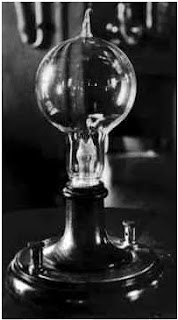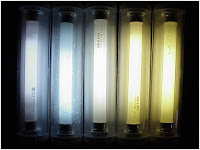Agriculture Age
Before the invention of the light bulb, people lit their houses with candles and oil lamps. It was potentially dangerous to keep an oil lamp or candle lit. Also, it was expensive to buy oil for the lamps. The light bulb evolved from gas and oil lamps. It progressed to gas and electric powered carbon-arc lighting systems and finally to the light bulb.
Industrial Age
The first light bulb was manufactured by Humphry Davy in 1809. And around 1875, Edison purchased a patent and based his improvements to the light bulb on it. Thomas Edison invented, or more accurately, improved upon a 50 year old idea of an electric lighting system that contained all the elements necessary to make the incandescent light practical, safe, and economical. He did not come up with the idea for using electricity to make light, but he revolutionized the idea. After he discovered the right arrangement of filaments, switches, circuits and such, people started becoming interested in the idea of electricity. It was a step to remove oil-fuelled heat and light from the average household.
Digital Age
Today, lighting is progressing and we have many choices to light our own houses. There are florescent lights, LED’s and still, incandescent bulbs. Neon lights are still used too. They are made of a glass tube filled with different types of gasses. The biggest changes we have made in incandescent lighting are slight differences in the filaments and glass. Some can give off more light; others can save energy because people are worried that we are throwing too many things away such as light bulbs. Light helps us in factories, businesses, stores and in our own homes. Edison’s invention is widely used almost everywhere in the world, but only in the nations that can afford the luxury.
The Future
Plasma, the 4th state of mater could power light bulbs of the future. Already, light is being generated by plasma but it isn’t as practical or efficient as LED’s or florescent lighting. But it looks really neat and futuristic. Perhaps in 100 years it will be more practical.








No comments:
Post a Comment